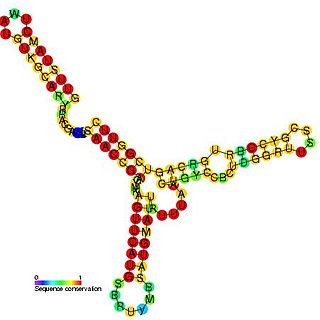Top Qs
Timeline
Chat
Perspective
Anti-Q RNA
RNA family From Wikipedia, the free encyclopedia
Remove ads
Anti-Q RNA (formerly Qa RNA) is a small ncRNA from the conjugal plasmid pCF10 of Enterococcus faecalis. It is coded in cis to its regulatory target, prgQ, but can also act in trans. Anti-Q is known to interact with nascent prgQ transcripts to allow formation of an intrinsic terminator, or attenuator, thus preventing transcription of downstream genes.[1][2] This mode of regulation is essentially the same as that of the countertranscript-driven attenuators that control copy number in pT181,[3] pAMbeta1[4] and pIP501[5] and related Staphylococcal plasmids.
Anti-Q is transcribed from the same segment of DNA as prgQ, except from the opposite strand, making it perfectly complementary to a portion of prgQ. Further experiments have experimentally confirmed the original consensus secondary structure and demonstrated that only certain regions of Anti-Q interact with prgQ.[6]
Anti-Q is derived from the 5’ end a longer transcript. The 3’ end of this transcript encodes PrgX, a repressor of prgQ transcription.
Remove ads
References
External links
Wikiwand - on
Seamless Wikipedia browsing. On steroids.
Remove ads

